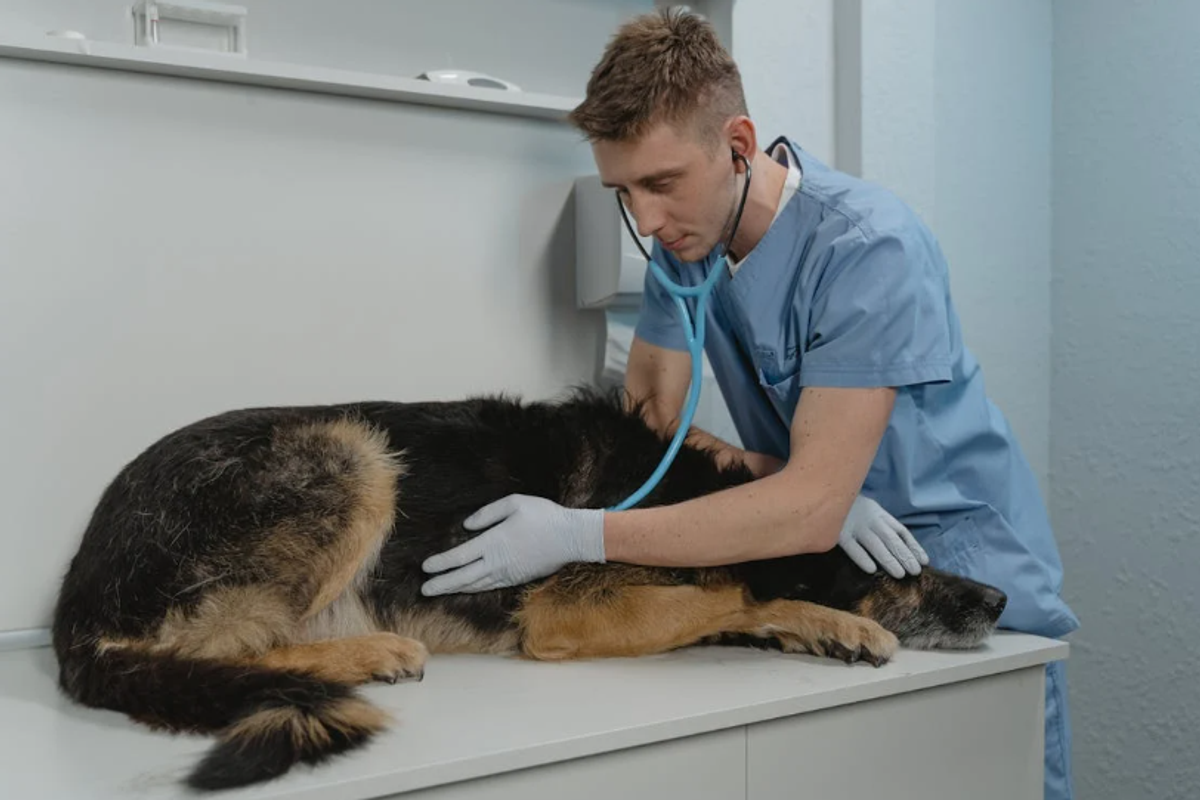There's an underreported health crisis among veterinarians. 4 reasons why they need help.
Abuse from customers is just the beginning.

A veterinarian examines a sick dog.
Imagine this.
You grow up loving animals – you're the rare type of human who loves cats and dogs equally. You're also fond of birds, lizards — pretty much anything that was worth of securing a spot on the Ark.
So you decide to become a veterinarian when you grow up so you can help as many of them as possible.
As a vet, you do get to help a lot of animals! But here are some other things you deal with on a daily basis.
Abandoned, mistreated, and abused pets. You know that horrible Sarah McLaughlin commercial with all the sad animals that haunts all of our dreams? Imagine waking up and clocking into work and seeing that, or worse, every single day.

Owners that can't or won't get proper care for their pets. Pet care, including essential medications and surgeries, is really expensive. Someone might adopt a puppy because they have the means to feed it and get it vaccines, but that doesn't mean they have $10,000 to shell out for hip surgery a few years later, and as a vet you may have to watch that animal go without.
(Though that's probably preferable to when owners come in wanting to euthanize perfectly healthy pets due to inconvenience.)
And then there's the fact that most veterinarians must perform euthanasia on a daily basis — a heartbreaking reality of the job.
All of that while often saddled with medical debt and making less than stellar wages.
As tough as these things are, many vets report that they're somehow the least stressful parts of their day-to-day.
The worst thing that vets actually deal with, though, is all the humans.
It's unfortunately very common for pet owners to get angry about the cost of care and take it out on veterinarians and their staff, hurling abuse and accusations of greed at them.
Cyber-bullying is a big problem, too, with angry customers leaving bad reviews and social media posts that vets aren't allowed to respond to due to privacy concerns.
From there, it's not unheard of for angry clients to make threats or even resort to violence against veterinarians.
The reality of the career is a far cry from just playing with puppies all day — it's frequently dealing with difficult, entitled, or emotional owners.
It should be no surprise, then, that veterinarians are facing a mental health crisis — but somehow it still is.

When I learned that this is one of the industries with the highest rates of depression and suicide, I was completely shocked.
Of course, thinking through the challenges of the job, it makes total sense.
But the issue clearly hasn't been getting enough attention.
A recent report from Australian dog food brand Royal Canin and the charity Love Your Pet, Love Your Vet spelled out some sobering data:
Vets were four-times more likely than the general population to commit suicide, with a heart-breaking 68% of veterinarians surveyed having lost a colleague to suicide.
Even at the less extreme ends of the spectrum, the stress, anxiety, burnout, and depression in the industry are catastrophic.
On top, the general public has no idea how bad the problem is — almost 80% of Australians surveyed were not aware of veterinary mental health issues at all.
The problem is just as bad in the USA and other parts of the World. But...
A report from the AVMA shows that things are getting (a little) better. Making more people aware will help.

Despite being an underreported crisis, there are tons of groups fighting to make an impact here — dog food brands, non profits, professional trade organizations — and the good news it might just be making a difference.
The 2024 shows that the number of vets receiving counseling has nearly doubled in the last several years, in part thanks to an increase in veterinary practices offering mental health coverage and other assistance programs.
There's been a huge emphasis on preventive care, which early returns show has been working.
These changes taking place inside animal hospitals and vet practices are huge.
But there are a lot of things we can do as pet owners to make things better, too.
We can show our gratitude and say Thank You. We can not be jerks when a service costs more than we think it should. We can grieve or be upset or angry and not take it out on the veterinarian who's just trying to help.
Our pets are our family members, and many of us would do anything for them.
Now we have to take better care — MUCH better care — of the people who care for our pets.

